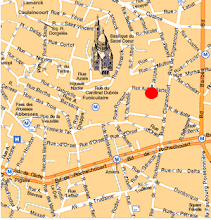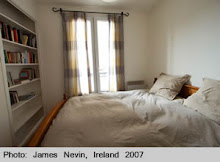Thursday 2 October 2008
Food scandal touches new dairies and Hong Kong (IHT)
BEIJING: Melamine has been found in milk powder from 15 more Chinese dairies, the authorities said Wednesday, and Hong Kong's food safety agency said its tests had found melamine in a Japanese-brand cheesecake that is made in China.
Contamination with melamine, an industrial chemical that can make a product appear to have more protein than it does, has been blamed for the deaths of four children and kidney ailments among 54,000 others. More than 13,000 children have been hospitalized and 27 people have been arrested in connection with the poisonings.
The Hong Kong Center for Food Safety said a sample of Lotte Cream Cheese Cake, manufactured by Lotte China Foods in China, was found to contain melamine.
According to data on the Chinese food safety administration's Web site, 31 new batches of Chinese milk powder were found tainted with melamine. Of the 20 companies on the list, 15 have not been named in previous tests.
It was a national holiday in China and officials could not be reached for comment.
In the most recent tests, nine of the batches containing melamine were produced by Sanlu, the company at the center of the scandal.
The new batches tested were mostly milk powder products for adults, ranging from full-fat milk powder to milk powder said to be high in calcium and zinc. Previous testing, results of which were posted on Sept. 16, found melamine in 69 infant milk powder batches.
The new figure brings to at least 100 the number of tested batches of milk powder found to contain melamine.
Tests have also found melamine in 24 batches of liquid milk produced by three of China's best-known dairies.
The Web site quoted the State Administration of Quality Supervision, Inspection and Quarantine as saying it had tested 265 batches produced by 154 different companies before Sept. 14. China has 290 companies making powdered milk, the administration said.
In Japan, a trading company has begun recalling a popular dessert imported from China after finding chemical contamination in the treats, officials said Wednesday.
The company, Kanematsu, said tests had found that the treats, made by a frozen food manufacturer in China's southern province of Guangdong, contained a tiny amount of melamine.
Melamine, which is high in nitrogen, is used to make plastics and fertilizers, and experts say some amount of the chemical may be transferred from the environment during food processing. But in China's case, suppliers trying to raise output are believed to have diluted their milk, adding melamine because its nitrogen content can fool tests aimed at verifying protein content.U.S. requires labeling origin
Under a new rule, meats, produce and some nuts sold in U.S. supermarkets must show their country of origin. Though the rule took effect Tuesday, the U.S. Department of Agriculture gave retailers six months to comply.
Country-of-origin labeling, already required for seafood, has long been sought by consumer groups, farmers and ranchers, who argue that consumers deserve to know where their food is coming from. Some consumer groups complain that the new rule is too broad because it exempts many processed foods, including roasted nuts and mixed vegetables.
The meat and grocery industries opposed the rule, saying it would be expensive and burdensome.
http://www.iht.com/articles/2008/10/01/asia/milk.php
A Place in the Auvergne
A Place in My Country
Ian Walthew
Farm Blogs
Ranch Blogs
Rural Blogs
Countryside Blogs
Smallholding Blogs
Urban Homesteading Blogs
Homesteading Blogs
Homestead Blogs
Allotment Blogs
Apiculture Blogs
Bee-keeping Blogs
Auvergne
Auvergnate
Auvergnat
Auvergnats
France
Rural France
Blogs about France
Paris / Montmartre/ Abbesses holiday / vacation furnished apartment rental
Contamination with melamine, an industrial chemical that can make a product appear to have more protein than it does, has been blamed for the deaths of four children and kidney ailments among 54,000 others. More than 13,000 children have been hospitalized and 27 people have been arrested in connection with the poisonings.
The Hong Kong Center for Food Safety said a sample of Lotte Cream Cheese Cake, manufactured by Lotte China Foods in China, was found to contain melamine.
According to data on the Chinese food safety administration's Web site, 31 new batches of Chinese milk powder were found tainted with melamine. Of the 20 companies on the list, 15 have not been named in previous tests.
It was a national holiday in China and officials could not be reached for comment.
In the most recent tests, nine of the batches containing melamine were produced by Sanlu, the company at the center of the scandal.
The new batches tested were mostly milk powder products for adults, ranging from full-fat milk powder to milk powder said to be high in calcium and zinc. Previous testing, results of which were posted on Sept. 16, found melamine in 69 infant milk powder batches.
The new figure brings to at least 100 the number of tested batches of milk powder found to contain melamine.
Tests have also found melamine in 24 batches of liquid milk produced by three of China's best-known dairies.
The Web site quoted the State Administration of Quality Supervision, Inspection and Quarantine as saying it had tested 265 batches produced by 154 different companies before Sept. 14. China has 290 companies making powdered milk, the administration said.
In Japan, a trading company has begun recalling a popular dessert imported from China after finding chemical contamination in the treats, officials said Wednesday.
The company, Kanematsu, said tests had found that the treats, made by a frozen food manufacturer in China's southern province of Guangdong, contained a tiny amount of melamine.
Melamine, which is high in nitrogen, is used to make plastics and fertilizers, and experts say some amount of the chemical may be transferred from the environment during food processing. But in China's case, suppliers trying to raise output are believed to have diluted their milk, adding melamine because its nitrogen content can fool tests aimed at verifying protein content.U.S. requires labeling origin
Under a new rule, meats, produce and some nuts sold in U.S. supermarkets must show their country of origin. Though the rule took effect Tuesday, the U.S. Department of Agriculture gave retailers six months to comply.
Country-of-origin labeling, already required for seafood, has long been sought by consumer groups, farmers and ranchers, who argue that consumers deserve to know where their food is coming from. Some consumer groups complain that the new rule is too broad because it exempts many processed foods, including roasted nuts and mixed vegetables.
The meat and grocery industries opposed the rule, saying it would be expensive and burdensome.
http://www.iht.com/articles/2008/10/01/asia/milk.php
A Place in the Auvergne
A Place in My Country
Ian Walthew
Farm Blogs
Ranch Blogs
Rural Blogs
Countryside Blogs
Smallholding Blogs
Urban Homesteading Blogs
Homesteading Blogs
Homestead Blogs
Allotment Blogs
Apiculture Blogs
Bee-keeping Blogs
Auvergne
Auvergnate
Auvergnat
Auvergnats
France
Rural France
Blogs about France
Paris / Montmartre/ Abbesses holiday / vacation furnished apartment rental
Labels:
China,
Dairy,
Food security
Subscribe to:
Post Comments (Atom)





















No comments:
Post a Comment